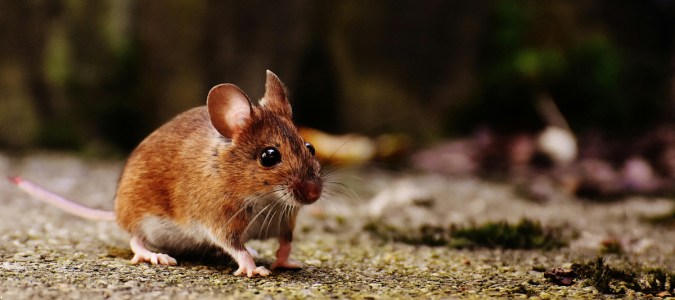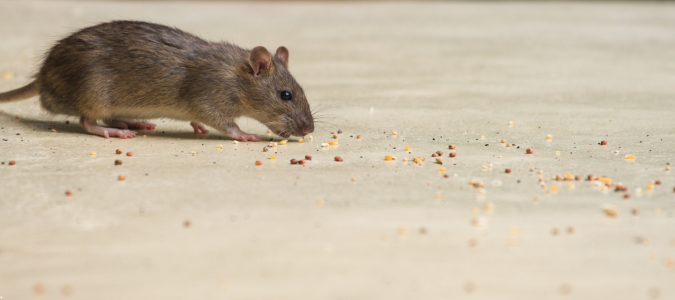Can Mice Climb?

The best way to control a mouse population is with the help of a professional pest control service. If you’re dealing with mice in your home, do not wait to act. Call in the experts so you can get your home back.
Can Mice Climb?
How do mice reach the top levels of your home? Most homeowners don’t realize that mice are excellent climbers, and they use this skill to help them find shelter that’s protected from predators.
Mice are known for scurrying along floorboards, but they can also climb up pipes, wires, walls, furniture, brick and wood. This is how mice can access your attic.
Another way mice use their climbing abilities is to reach your countertops, cabinets or upper shelves of your pantry to access more food. Mice have strong claws and light bodies, so they can gain traction on a variety of vertical surfaces.
How Small Openings Make It Easy for Mice to Enter
Mice are much more flexible than they look, and they’re able to squeeze their bodies into very small openings. They can fit themselves through a hole that’s only the size of a dime. This ability, combined with their climbing skills, allows them to access a variety of entry points around your home.
For example, small openings around your windows, doors or chimney are perfect access points for mice. Mice can also enter through floor vents. These pests enter homes in search of three basic needs: food, water and shelter.
They can quickly make their way into your home and find food and water sources. They’ll also identify a spot to build their nest that keeps them warm and out of harm’s way.
Signs of Mice
There are several signs that you may have mice in your home, such as hearing scratching and scurrying sounds inside your ceilings and walls. You may also spot their droppings along your baseboards or inside your cabinets.
Mice use a variety of materials to build their nests, such as insulation, shredded paper or fabric. Spotting these materials loose around your home is a sign that mice could be nearby.
If you notice any of these signs of mice in your home, contact a pest control service. Keep in mind that mice are excellent climbers and can find several ways to get into your home, so it’s important to stay vigilant against an infestation.

Will Mice Leave if There is No Food?
One of the primary reasons that mice seek shelter indoors is to find a reliable food source. Your kitchen is a much more dependable food source than the wild, so it makes the hunting and gathering process easier.
Since their food source plays such a significant role in their behavior and activity, it’s natural to wonder if removing their food options will make them leave. Unfortunately, it’s not as simple as that.
Removing available food can go a long way in deterring a mouse infestation, but it’s not a perfect solution if you’re already dealing with an established infestation.
What Do Mice Eat Indoors?
Mice are resourceful and resilient pests that can survive on very little food when necessary. It’s almost impossible to remove all potential mouse food sources. For example, they can survive off the bread crumbs on the top of a toaster. Mice are fantastic foragers and will find scraps wherever they can. They’ll also eat pet food and bird seed if needed.
Some homeowners wonder if dogs keep mice away, but dogs are not known to control mouse infestations. Mice can even benefit from pets in the house because they can eat their food, drink their water and use their bedding for nesting material.
While eliminating their food source won’t solve a mouse problem, it’s still an important prevention measure that homeowners should take.
How To Help Prevent Mice
It’s important to clean up spills and crumbs right away and avoid leaving any food out on kitchen counters. Dry food should be stored in your pantry in airtight containers rather than paper or thin plastic. Wash dishes promptly instead of leaving them in the sink, and keep a tight lid on your kitchen trash can.
Along with eliminating food sources, you should also seal up all potential mouse entry points to help prevent further infestations. Inspect the areas around your windows, doors, foundation, roofline or walls for gaps and holes that mice could squeeze through.
Another reason mice are attracted indoors is that they can often find a reliable water source. Fixing leaky pipes and clearing your gutters will help eliminate some of their water sources.
All of these prevention measures can complement professional pest control treatments, but they are not enough to control a mouse infestation. For the best and most efficient results, you need to work with a pest control professional.

Will Mice Leave if You Clean?
Will mice leave your home if you clean? The short answer is no; however, keeping a clean home is still helpful in preventing a mouse infestation.
Like eliminating food sources, cleaning your home may help deter mice from coming inside. Mice like clutter and mess because they can easily find food, water and shelter in that kind of environment. For example, mice will love a messy kitchen filled with crumbs that they can feed on.
How Mice Adapt to Clean Environments
Unfortunately, cleaning your home is not enough to make mice leave. It’s important to remember that mice have strong survival skills. They are opportunistic pests that can survive on little food and build nests in a variety of settings. They quickly adapt to changes in their environment and rarely leave it.
Cleaning your home can go a long way in preventing a mouse infestation and complement expert pest control treatments, but it’s not enough to get rid of an existing infestation. For the most effective solution, contact a local pest control company.

What To Do if I See a Mouse in My Bedroom?
If you see a mouse in your bedroom, it’s likely an indication that more are nearby. Mice live and operate in colonies that grow rapidly, so it’s important to act quickly when you see one.
Act Fast After a Mouse Sighting
The first thing to do is seal up the entry points that the mice used to get inside your home. Keep in mind that they can squeeze through a hole the size of a dime, so it’s important to be thorough.
Next, remove all food and water sources from your bedroom. This includes crumbs, pet food and food wrappers. Don’t leave cups of water or other beverages sitting out, and remove all sources of standing water, such as water from a humidifier.
Common Myths About Mice Repellents
Some homeowners wonder if mothballs keep mice away, but they are not an effective tool for keeping mice out of your bedroom.
The best way to deal with a mouse infestation is to work with a pest control service. They have professional-grade solutions and the expertise needed to control the entire mouse population in your home. They can also help you conduct a thorough inspection of your home to identify and seal all mouse entry points and advise you on personalized prevention methods.
Do not ignore a mouse sighting in your home. Call a pest control service to take action before the problem gets worse.
Control Mice With Professional Help
Mice look like innocent creatures, but it’s important to remember that they are resilient survivalists with unexpected skills. They can climb to tall heights and survive on very little food, which makes getting rid of a mouse infestation difficult.
There are several things that homeowners can do to help prevent mice from entering their homes; however, controlling an existing infestation requires professional help. If you’re dealing with mice in your home, reach out to a local pest control service.
Chem-free Can Handle Your Mouse Problem
If you spot mouse droppings, nesting materials, gnaw marks or other signs that point toward mice living in your home, it almost certainly means you have a mouse infestation. That requires a more far-reaching solution than just a few strategically placed traps. Not sure how to get rid of rodents? The pest control specialists at Chem-free can develop a comprehensive plan to help control rodents.

